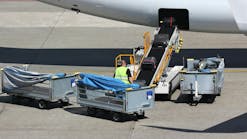Washington, DC -- The Transportation Security Administration (TSA) today continued comprehensive efforts to strengthen air cargo security by announcing requirements designed to protect the more than 50,000 tons of cargo that is transported aboard passenger and all-cargo aircraft each day. The security requirements mark the first substantial changes to air cargo regulations since 1999, and represent a joint government-industry vision of an enhanced security baseline.
"Working with the industry we have set a solid foundation for a major segment of the transportation network," said TSA Assistant Secretary Kip Hawley. "In addition, TSA is working with our partners on a series of separate operational measures that raise security in air cargo."
The Air Cargo Final Rule makes permanent some practices already in place and adds others. Major new security measures include:
- Consolidating approximately 4,000 private industry Known Shipper lists into one central database managed by TSA. This will allow TSA to have more visibility into the activities of companies shipping on passenger aircraft and permit more in-depth vetting of known shippers.
- Requiring background checks of approximately 51,000 off-airport freight forwarder employees.
- Extending secure areas of airports to include ramps and cargo facilities. This will require an additional 50,000 cargo aircraft operator employees to receive full criminal history background checks.
- Requiring the employees of more than 4,000 freight forwarders to attend enhanced security training courses developed by TSA.
These new measures will be enforced by an expanded force of air cargo inspectors. In the coming weeks, TSA will complete the hiring of 300 air cargo inspectors. These inspectors are stationed at 102 airports where 95 percent of domestic air cargo originates.
The policy changes implemented by the final rule complement ongoing TSA operational and technological initiatives that aim to strengthen air cargo security through a risk-based approach that balances the twin goals of enhancing security without unduly disrupting the flow of commerce. Operational measures recently implemented include:
- Surge initiatives that incorporate an element of unpredictability into the daily inspection activity of approximately 1,000 aviation security inspectors at airports across the country.
- Using transportation security officers and TSA equipment to screen cargo that is delivered directly to airport ticket counters.
- Expanded use of canine explosives detection teams in air cargo facilities.
The details of how to implement the new regulatory changes are spelled out in the security programs that air carriers and freight consolidators must maintain. Draft security programs will be provided to the carriers and consolidators for comment concurrent with release of the Final Rule. Enhancements are expected to be phased in during the next six months.
Assistant Secretary Hawley said, "In the time-sensitive and dynamic air cargo industry, a layered security approach is essential to thwarting would-be terrorists. Today's important policy enhancements, when combined with ongoing operational and technological initiatives, create a more vigorous, risk-based strategy for enhancing cargo security. We will continue to invest - along with our partners in industry - in policies, programs and ideas that raise the bar even higher."
The new cargo rule is another example of how TSA works with its industry partners to ensure the security of air cargo. When industry partners do not fulfill their security responsibility, the agency takes immediate and appropriate action. In recent weeks, TSA revoked the air carrier certification of J.H World Express, Inc., based in Los Angeles; Inter-Shipping Chartering Corporation, based in Miami; and denied the renewal of the cargo security program for Aramex International Courier, based in Washington, D.C. and New York. These enforcement actions prohibit the companies from tendering cargo for transport on passenger aircraft in the United States and reinforce the agency's commitment to ensure the air cargo industry meets its responsibilities.
Full details of the Air Cargo Final Rule will be published in the Federal Register in the coming days.




